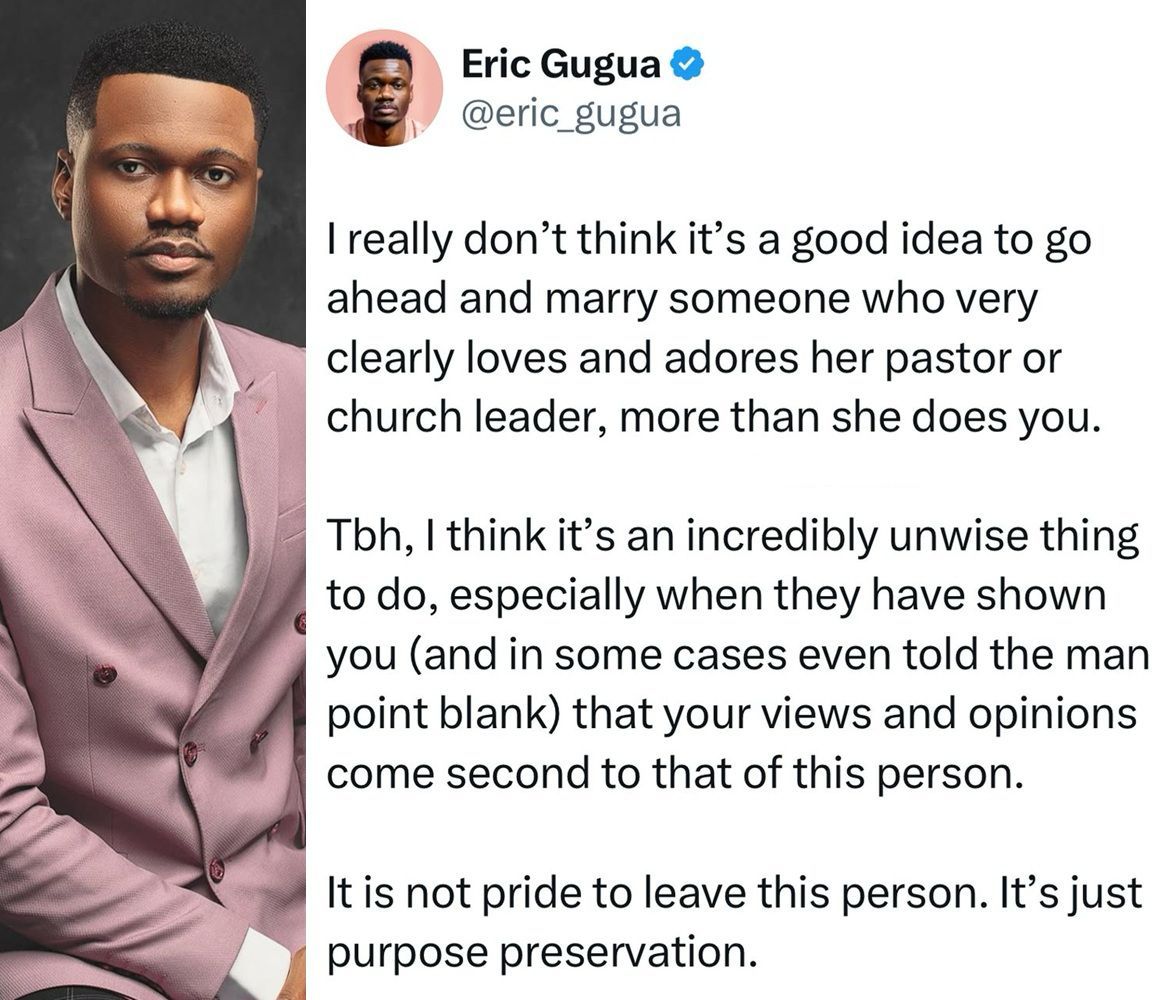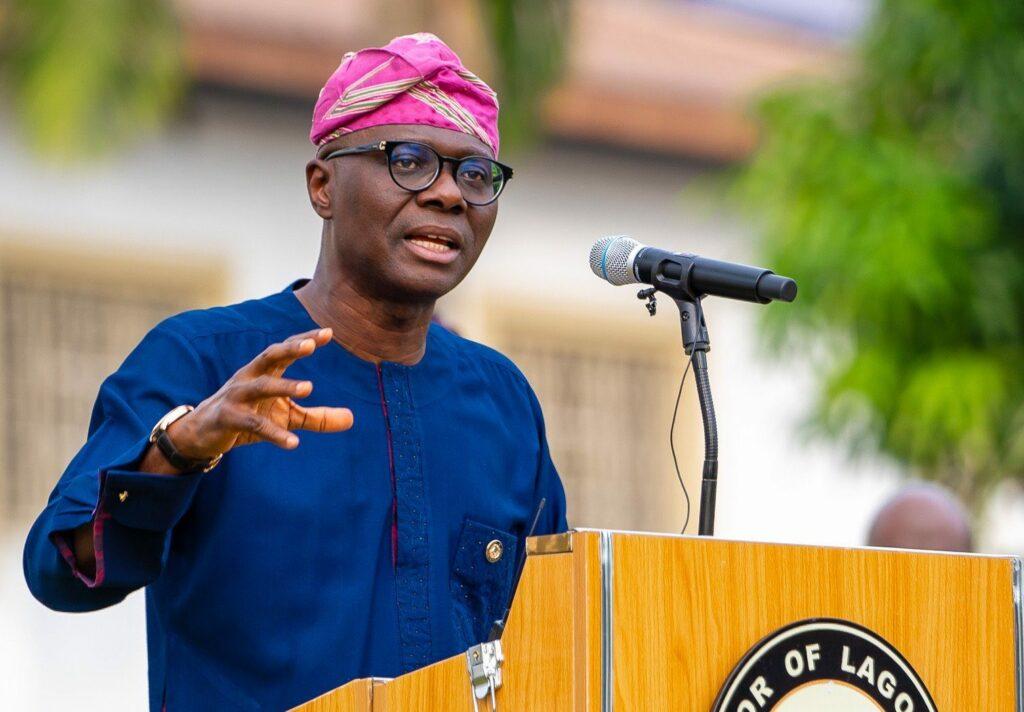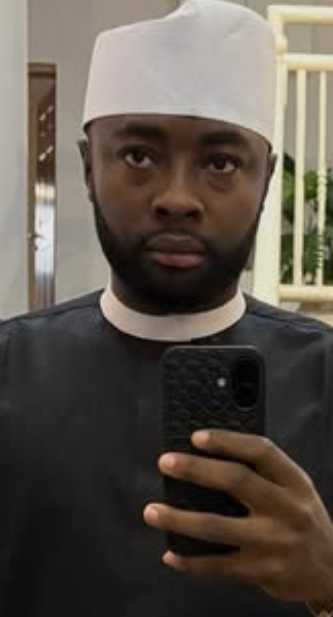
Love Thy Pastor More Than Thy Partner? Eric Gugua Sparks Heated Debate on Relationship Red Flags

In a society where religion holds immense influence over daily life and personal decisions, Nigerian media personality Eric Gugua has stirred up a firestorm of conversation with a bold and unapologetic take on love, loyalty, and misplaced devotion in romantic relationships. Taking to social media to share his thoughts, Gugua warned against marrying someone who shows more adoration and emotional allegiance to their pastor or church leader than to their romantic partner, branding it an “incredibly unwise thing to do.”
“I really don’t think it’s a good idea to go ahead and marry someone who very clearly loves and adores her pastor or church leader more than she does you,” Gugua posted, igniting a wave of reactions across X (formerly Twitter), Instagram, and various online blogs. His take, though controversial, seems to have struck a chord in a society where the intersection between faith and romance often leads to blurred boundaries and power struggles.
In a cultural setting like Nigeria’s—where spirituality is not only revered but often equated with moral standing and wisdom—religious leaders command immense respect and even emotional loyalty from their followers. For many women and men alike, their pastors serve as spiritual fathers, life coaches, therapists, and in some extreme cases, the ultimate authority on all personal and marital matters. While many see this as harmless devotion or an extension of their religious discipline, Gugua’s remarks confront the potential emotional imbalance that can arise when a partner’s affection or loyalty tilts heavily in favor of a spiritual leader over their spouse.
The media personality went on to say that it’s not prideful or egotistical to walk away from such a relationship. In his words, “It is not pride to leave this person. It's just purpose preservation.” That phrase—“purpose preservation”—has quickly become the center of online debates, quoted and dissected by commentators and ordinary users who either see it as a profound warning or a dramatic overreaction.
Gugua’s perspective, though brash to some, appears rooted in real-world concerns that many couples face in religious communities. Numerous anecdotes shared in response to his post reflect situations where individuals, mostly men, have felt undermined in their relationships by the overwhelming influence a pastor or spiritual mentor wields over their partner. In some of these stories, women reportedly refused to make personal decisions—ranging from career choices to family planning—without first “hearing from Daddy,” a term often used to refer to their church leader. Others described partners who insisted on comparing their husbands or fiancés to their pastors, constantly measuring their faith, income, or leadership qualities against the man behind the pulpit.
Critics of Gugua’s stance argue that his message promotes insecurity or seeks to limit women’s spiritual freedom. However, many of his supporters counter that the issue is not about religious commitment but about priorities and boundaries. They assert that any relationship in which one partner’s voice and opinions are consistently overshadowed or dismissed because of someone outside the relationship—religious or not—is fundamentally flawed.
More sobering are the experiences of individuals who ignored this imbalance, got married anyway, and later found themselves in marriages where they constantly played second fiddle to religious authorities. In some cases, pastors reportedly intervened in intimate matters, gave instructions that conflicted with the husband's leadership in the home, or advised wives to “pray and obey” rather than communicate directly with their spouses. For those who found themselves trapped in such dynamics, Gugua’s tweet reads less like an opinion and more like a long-overdue validation.
Beyond individual relationships, Gugua’s post also exposes a broader conversation about the emotional entanglements that sometimes develop between congregants and religious figures. In highly charismatic or prophetic churches, where spiritual leaders are often seen as mediators between God and man, followers sometimes project deep emotional needs onto their pastors—seeking affirmation, protection, or even love that they may not find elsewhere. Over time, this adoration can evolve into emotional dependency, making it difficult for a romantic partner to compete or find balance in the relationship.
It’s worth noting that Gugua’s comments were directed at those who have already seen warning signs—those who’ve been shown clearly, or even told directly, that their opinions and place in the relationship rank below that of the pastor. His warning, then, is not an attack on religious women or devout partners, but a wake-up call to men and women who knowingly walk into unions already burdened by emotional third parties.
The media landscape has seen no shortage of public figures speaking out about religious overdependence and unhealthy spiritual relationships, but Gugua’s remarks hit differently because they touch on love, pride, and self-worth. “It’s not pride,” he emphasized. And in a world where people are often guilt-tripped into staying in relationships to avoid appearing selfish or egotistical, his framing of the decision to walk away as “purpose preservation” adds a layer of emotional self-care that resonates deeply with a growing audience that values mental and emotional wellness.
Still, not everyone agrees with the conclusion. Some religious leaders have defended the idea that a truly spiritual woman would naturally hold her pastor in high regard, sometimes even above her partner, especially if that partner is not as spiritually “mature.” They argue that spiritual leadership plays a critical role in shaping personal growth and decision-making, and that men should not be threatened by that.
But for those who read between the lines, Gugua’s message is less about spiritual rivalry and more about emotional alignment. In relationships—especially ones that are headed toward marriage—respect, communication, and mutual understanding must take center stage. Any external influence, whether it’s a parent, a friend, or a pastor, that constantly overrides the dynamics between partners is likely to become a source of frustration and imbalance.
Eric Gugua didn’t issue a sermon or an academic essay. He didn’t preach or pontificate. He simply spoke the truth that many have felt but were too afraid to say: love is sacred, but misplaced loyalty can quietly destroy it. And when you begin to feel like a third wheel in your own relationship, when your voice is constantly muted in favor of someone on a distant pulpit, it might be time to reconsider what kind of love you’re really signing up for.
Purpose preservation, as Gugua calls it, might just be the boldest form of self-respect. Whether or not the internet agrees, the message is out—and it’s not one that will fade quietly.


